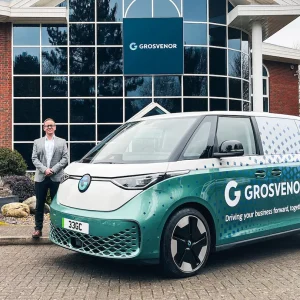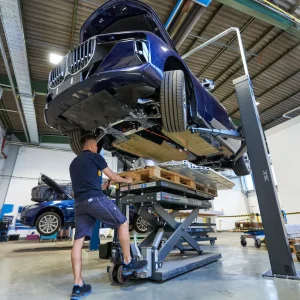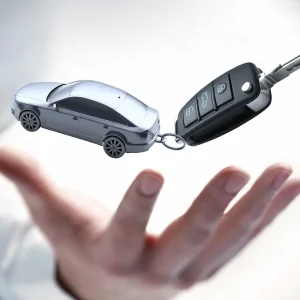“I think the advantage is that we’re all from the industry, so we can really empathise with what people are saying about the challenges they face, because we’ve been there and done it,” Digital Innk’s CEO, Angela Montacute, tells Business Car. Formed in 2020, it is one of the newer fleet software companies on the block, and specialises in service, maintenance, and repair (SMR) management.
It would certainly not be the first fleet software company to wade into such realms, but the collective backstories of Digital Innk’s senior team give it something of a fresh angle. Montacute is a former chief operating officer at Arval, while partnerships director Mohammed Imran, operations director Stephen Phillips, CCO corporate Arnaud Bosvieux, and CCO fleet Richard Spencer are all fellow alumni of the same leasing giant. The company’s website claims its top brass collectively has more than 175 years of industry experience, and its approach is very much, ‘we’ve been there’.
“We’re trying, really, to fix the problems that we’d all encountered with what are quite labour-intensive, paper-intensive, telephone-intensive processes in fleet, and to see if we could digitise them like the banks and deliveries have done.
“We started creating software which would help link a driver to their companies, their fleet operators, [and] a policy to direct them to booking services, maintenance, repair, glass, etc. And we realised with this concept, that there was quite a big demand in the marketplace for something new; something that was technologically advanced.”
Its core product is a platform and app combo known as ViSN which, at its most basic level, facilitates and manages fleet garage bookings. The app, which can be white-labelled, is designed for drivers, and issues them with the likes of service and MOT reminders, allows them to automatically book in a service or repair job, and there is the option to add a licence checking/driver compliance service and a vehicle walkaround inspection function. All of the above can also be done via an old-fashioned web link, for drivers who do not have a work phone and either cannot download a business app on their personal device or just do not want to.
The platform (i.e. not the app) is aimed at leasing firms, brokers, rental companies, and fleets with maintenance packages. Montacute says access can be toggled according to each party’s arrangements, so if a fleet operator does not want drivers to book in their own service work, they have the option of handling it independently. Similar criteria can be applied at leasing/rental/broker level – if the arrangement is that SMR is outsourced to the funder, they are the ones with access, and vice versa for fleets that do that part themselves.
“The leasing company or the rental company can give what we call a sub-customer view to their customer [the fleet],” says Montacute, “their customer comes in directly from their own portal if they want, or if [the funder] does it for them, because it’s a full outsourced service, they can book everything in.”
Sitting at the end of that, is the garage, and there is a particular focus on vehicle downtime. “It’s all cloud-based software, so all you need is a browser in the garage,” adds Montacute. “The garage can accept the booking, they can see what’s requested – if you’ve requested a courtesy car, etc. – and when the vehicle arrives, it’s checked in, like you would check in your luggage at the airport, which starts the clock ticking. If the driver’s using the app, they can check the car in; if not, then the supplier can, and that starts the downtime management clock ticking.”
The firm says it uses “external sources” to keep tabs on the amount of time each job takes for a particular vehicle, and the platform can also account for companies with their own rates – typically the likes of big leasing firms with pre-established commercial fees for labour, parts, etc. The idea, according to Montacute, is to “avoid having to rekey things that are not necessary.
“The job sheet is always live, so everybody can always see where it’s at. If it’s a leasing company, for example, they can authorise the works, and we have a live chat in the platform, which is a bit like WhatsApp. If you want a photo or if you want to authorise a job inside the platform, it’s all there. Then, when everything’s been authorised, we have electronic files that pass every night so the customer can pay the supplier through their normal finance systems.”
The earliest version of the platform arrived in beta form in late 2020, chiefly so the company had something to show to its prospective clients. As Montacute puts it: “Having been on the other side of the desk, I didn’t want to be going around just selling slideware. A lot of people come and present to you, but they actually haven’t got anything tangible. The only way we were really going to be credible was to build something that we could show was real.”
Early interest was reportedly good, but there was a snag: fleets and leasing companies would ask if any garages had signed up and vice versa.
“It was really interesting when we started talking to people, because you’d go to suppliers [garages] and they’d say, ‘yeah, we love your idea. I haven’t got any customers,'” says Montacute, “and you’d go to potential customers, and they’d say, oh, we love your idea. Have you got any suppliers?'”
The firm then found its feet with a company that agreed to be an early adopter, running the software in conjunction with its existing garages to provide feedback and gradually prove its efficacy before it got going properly in 2022.
“Last August, we had our first paid live transactions,” says Montacute, “all the way from someone booking an appointment, the car turning up at the garage, a job sheet being raised, being authorised, and then payment being settled, which was brilliant. And then this year, it’s just really accelerated.”
The firm now claims to have signed up 3,200 garages and have more than 300,000 vehicles registered to the platform, while transactions are reportedly on the up.
It claims flexibility is among its strengths and promises to duck and dive according to what fleets and funders need, to save them having to plead with upper management to deviate from existing and typically rigid tech schedules and budgets, often known as ‘IT Roadmaps’ in corporate settings.
“In a big company, you’ll probably agree your IT roadmap at budgeting time the year before,” explains Montacute, “so if you want to do something suddenly or quickly, it means that you have to go through some process to get it onto a roadmap. What we wanted to make sure is there were no barriers to taking our product. If you need something doing, we do the heavy lifting for you.”
The firm is also big on artificial intelligence. It appointed automotive tech specialist Scott Christie (one of the few in its senior team who is not an Arval alumnus) as non-executive director to oversee the rollout of AI in various forms across the ViSN platform, which already uses its data for the likes of predictive servicing.
“Some of the stuff that we can do already with the data sets is around predicting things like when the next service might be due or what types of things are likely to be in it based on previous behaviours,” says Montacute, who then goes on to discuss future applications for the tech.
“If you think of Chat GPT, where you can use natural language to ask questions, I’d really like to put some of that in, so that instead of having to build queries to investigate the data, you can just ask the database to
produce things.
“It’s less about AI, but more about the natural language capability: ‘what’s costing me money?’ ‘what actions should I be taking to reduce cost on my fleet?’ You could start to calculate or predict when the best time is to get a vehicle back [from a lease], because it’s likely to start costing more money based on the history of what we’ve found.”
The company is due to host a customer forum on 7 November, which will involve “a bit of a reveal”. This may be the fruits of letting its tech team off the leash to play with its data and reporting suite and mash them up with AI and GPT tech.
“I want to hear from both our customers and the garages [at the forum],” says Montacute, “what are the things that frustrate them and what are the things that they find difficult? If they only had this piece of information at their fingertips, how much easier would it be to be able to improve the service that they provide, reduce their costs – all of that type of activity. I’m 100% certain that with the advancements in both the basics of machine learning AI, we should be able to make a big difference to the way people manage and optimise their fleets.”





